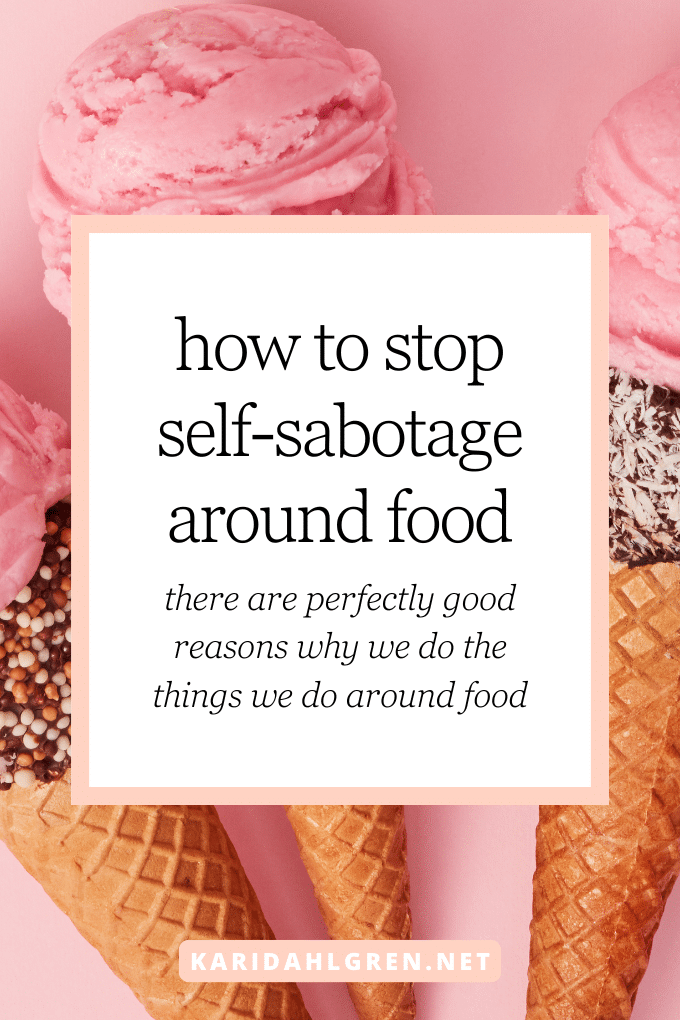
Self-sabotage happens when we take two steps back after taking two laborious steps forward. If you’re stuck in a cycle of self-sabotaging weight loss, it’s important to look beyond sheer willpower.
You might be asking yourself, “Why do I sabotage my diet?” or “Why do I sabotage myself with food?” The truth is, the roots of self-sabotage run much deeper than food, diet, and willpower. Both your body and your mind are constantly working behind the scenes, sometimes in ways that can derail your progress—and sometimes even for good reason.
In this article, we’ll peel back the biological and psychological layers of self-sabotage around food. I’ll share my personal experience with self-sabotage, how I personally overcame this frustrating struggle, and plenty of evidence-based for learning how to stop self-sabotaging weight loss efforts.
Understanding Self-Sabotage in Weight Loss
Self-sabotage refers to behaviors that derail your goals, even when you’re deeply committed to achieving them. If you tend to self-sabotage your own weight loss efforts, you might find yourself behaving in frustrating ways that set back your progress, despite your best intentions.
For example, maybe you “eat clean” for an entire week only to binge eat junk food on Friday. Maybe you vow to stop perusing the office snack shelf only to find yourself compulsively grabbing snacks when you feel stressed or bored.
Self-sabotage feels like perpetually taking two steps back after painstakingly managing two steps forward. It’s a frustrating phenomenon that many people grapple with—myself included, before I finally stopped binge eating. Understanding why self-sabotage occurs is key to breaking free from it; and both biological and psychological factors play a significant role.
The Biology of Self-Sabotage
When it comes to self-sabotaging weight loss, the body plays a major role in undermining even the best of intentions. Our bodies are wired to resist dietary restriction by triggering biological responses that drive hunger and make food more appealing, especially hyperpalatable foods (those high in fat, salt, and sugar).[1]
A study published in the American Journal of Clinical Nutrition, a 25% reduction in food intake significantly increased hunger, food reward (desire for snacks), and overall food intake in participants.[2]
This biological response often leads to a cycle of restriction and overeating, which can feel like self-sabotage when it’s really your body trying to protect itself from energy depletion.
Hormones also play a role. Ghrelin, the hunger hormone, increases during calorie restriction, while leptin, one of the fullness hormones, decreases.[3] This hormonal shift makes it even harder to stop eating, further fueling the cycle of overeating.
In short, sometimes self-sabotage is the body’s way of protecting itself, not a sign of failure. If you ever catch yourself wondering, “Why do I sabotage my diet?” it might be time to assess your daily caloric intake to make sure that it’s enough.
This might beg the question: how can I lose weight if I’m not creating a caloric deficit? That’s where the psychology of weight loss comes into play.
Discover your eating psychology strength: Even if you struggle with self-sabotage, I bet you have a hidden strength. My quiz will reveal what that strength is. Click here to take the eating psychology quiz now.
The Psychology of Self-Sabotage
From a psychological perspective, self-sabotage can happen when subconscious, hidden beliefs that clash with conscious goals. This internal conflict, known as cognitive dissonance, occurs when you hold two or more opposing beliefs, creating tension that undermines your progress.[4]
For instance, someone might consciously desire weight loss while also holding a subconscious belief that “thin people are stuck up.” This clash creates cognitive dissonance, and self-sabotage follows.
Another psychological factor contributing to self-sabotage is the fear of success. After achieving a goal like weight loss, someone with a fear of success might begin to overeat because their subconscious mind insists that they aren’t worthy of this new version of themselves.
This aligns with research on imposter syndrome, where high-achieving individuals feel fraudulent and unworthy of their accomplishments, ultimately undermining their success.[5]
If you’ve ever found yourself asking, “Why do I self-sabotage weight loss?” I hope you’re beginning to see the perfectly understandable reasons why we do the things we do. To give even more context, I’d like to share a personal story about the limiting beliefs that fueled my own self-sabotaging weight loss behaviors.
My Clearest Moment of Weight Loss Self-Sabotage
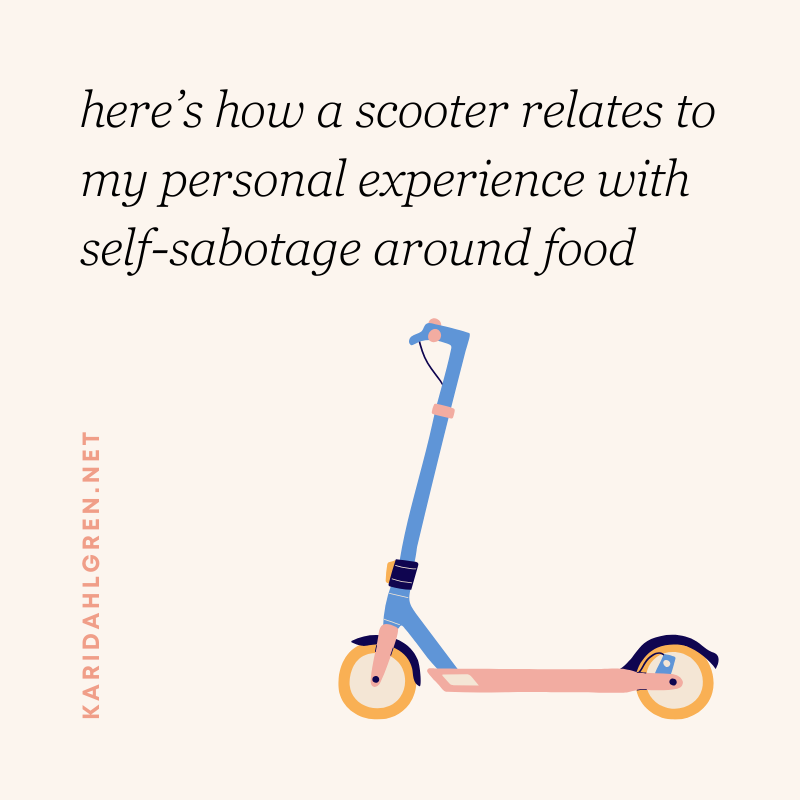
When I was 7, I got a scooter and spent hours every day riding it up and down the neighborhood. It was a huge shift from being inside all the time; and to no one’s surprise—except maybe mine—I lost 14 pounds in just a few weeks.
I remember showing my mom my size XL pants that had become too big, thinking it was funny. It didn’t mean anything to me back then. I wasn’t influenced by diet culture yet, and I didn’t have “weight loss goals.” I was just having fun.
I only felt the significance of what I did when my dad pulled me aside one day, handed me a gallon of milk, and said, “This is seven pounds. You’ve lost twice that just from scootering. Good job!”
But shortly after, my older brother said something mean to me, and I threatened to hit him (it’s not something I’m proud of and I never followed through). Usually, that threat was enough to get him to back off. But this time, something had changed. I didn’t have my usual size to intimidate him. He wasn’t scared, and suddenly, I felt powerless.
My dad stepped in and said, “Kari, you can’t threaten him anymore. You don’t have the extra weight to protect you.” And just like that, a belief took root: being thin isn’t safe. I need to keep weight on to protect myself.
Needless to say, I self-sabotaged and regained those 14 pounds, struggling with overeating well into adulthood. While this story might seem obvious now, I didn’t even realize that limiting, subconscious belief was running in the background until I did the following work.
The First Step for Stopping Self-Sabotage Around Food: Self-Inquiry

When you hold conflicting beliefs—like “I want to lose weight because it’ll improve my life” but also “I’m unsafe when I lose weight”—self-sabotage around food, diet, and weight loss is almost inevitable.
For me, carrying extra weight made me feel safe, so every time I tried to diet, my subconscious would panic, shouting, “This isn’t safe!” The result? I’d binge after every dieting attempt. This is why uncovering your subconscious beliefs about food, weight, and life is so important. So, how do you do that?
Self-inquiry, or the practice of asking yourself questions, is the best tool I’ve found. Specifically, self-inquiry with pen and paper. You have better access to your subconscious thoughts when you write something down versus thinking it through in your head.
My workbook, Why We Do the Things We Do, is the perfect guide for this. It’s packed with 75 pages of prompts designed to help you uncover your limiting beliefs that fuel self-sabotage around food and weight loss.
As I previously mentioned, a need for protection is one of the biggest triggers for self-sabotaging weight loss. To help with this, some of the exercises in Why We Do the Things We Do are titled ‘The Safety Net’ and ‘Boundaries & Protection’ to help you explore exactly what you believe about how your body is protecting you—in a psycho-spiritual sense. (Your body is always protecting you in a physical sense.)
How to Stop Self-Sabotaging Weight Loss
Self-inquiry is one of the most important steps for learning how to stop self-sabotaging weight loss, but it’s not the only step. Let’s dive into a few other supportive strategies that can help you stop self-sabotaging your weight loss efforts.
1. Redefine Your Relationship with Diet Culture
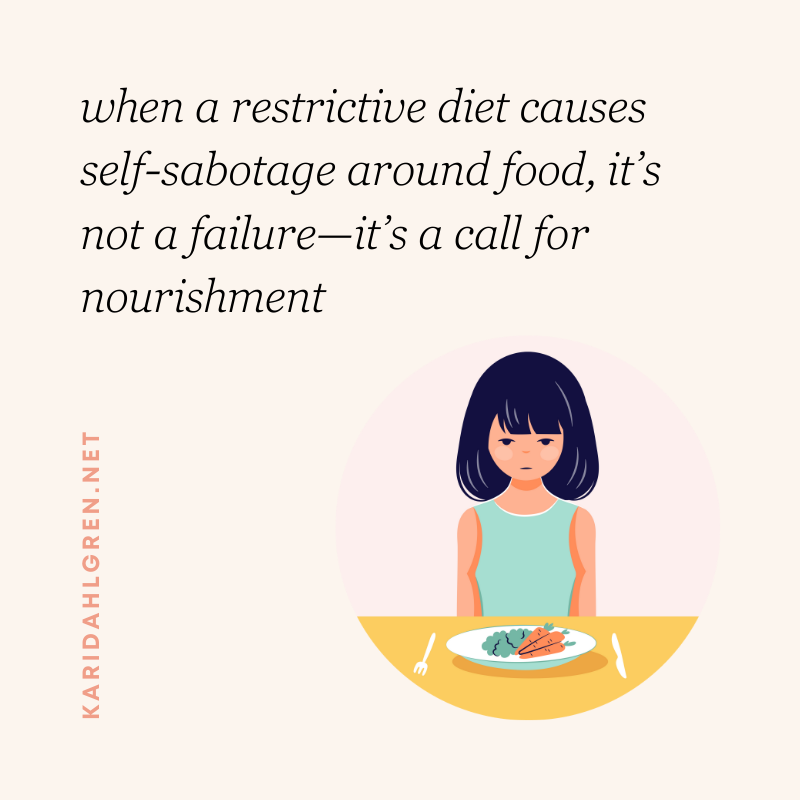
As mentioned before, self-sabotage around food and diet can be psychological or biological. No matter how much you finesse your psychology, if you’re depriving yourself of adequate or enjoyable food, you’re setting yourself up for diet self-sabotage.
Make sure that you’re eating enough calories to sustain your energy needs. Many people attempt to create a caloric deficit to lose weight, but the ‘calories in, calories out’ myth has been debunked.[6] Instead of struggling with restriction-fueled overeating, consider giving up dieting altogether and focusing on listening to your body.
If you eat when you’re hungry and stop when you’re full, your body is likely to settle upon a natural weight that’s healthy and right for you. A practice that can help you get there is intuitive eating, a style of eating that involves listening to your body’s internal cues for hunger and fullness and making food choices based on health as well as enjoyment.
According to a study published in The Journal of the Academy of Nutrition and Dietetics, intuitive eating leads to better eating habits and greater weight stability compared to dieting.[7] Shifting from diet culture’s rules to intuitive eating can help you stop the cycle of self-sabotage.
2. Embrace Meditation and Mindfulness
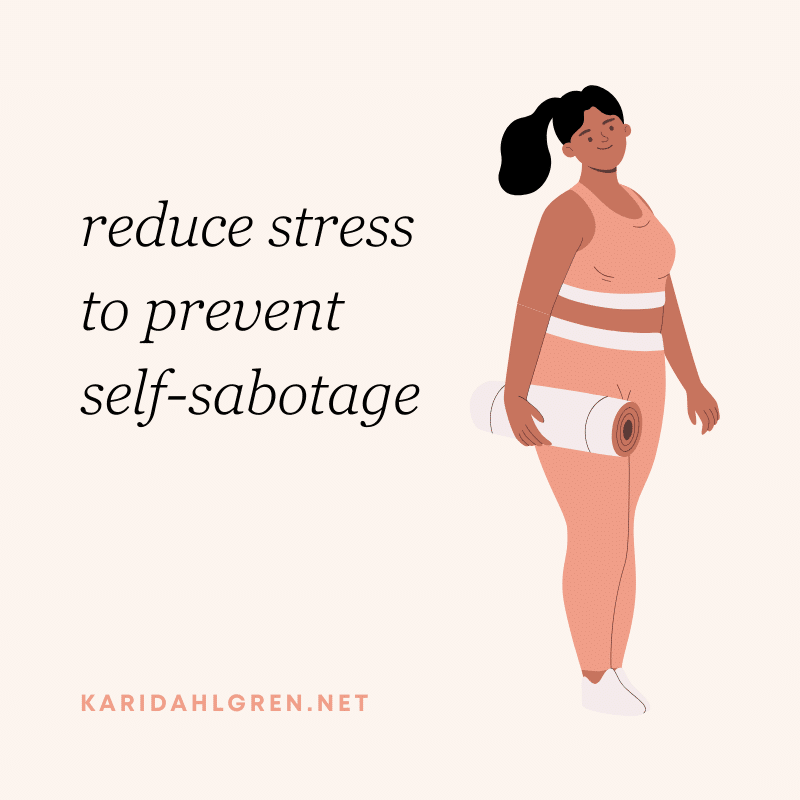
Meditation and mindfulness are powerful tools for managing self-sabotage because they help you pause and respond thoughtfully instead of reacting impulsively. When you meditate, you create space between your thoughts and your actions, which is key to intercepting moments of self-sabotage.
Meditation also helps reduce stress, a major factor in weight gain. A meta-analysis published in the Journal of Psychiatric Research found that meditation practices reduce physiological markers of stress like cortisol and blood pressure.[8] Stress is closely linked to weight gain, particularly around the abdomen.[9] Therefore, managing stress through mindfulness can support your weight loss journey.
But it’s also much more than that. When we prioritize relaxation and mindfulness over stress, we’re more likely to be in tune with our bodies and listen to our intuition. Weight loss doesn’t have to be the goal—in fact, many people can benefit from letting go of it as a goal entirely.
3. Focus on the Process, Not the Outcome
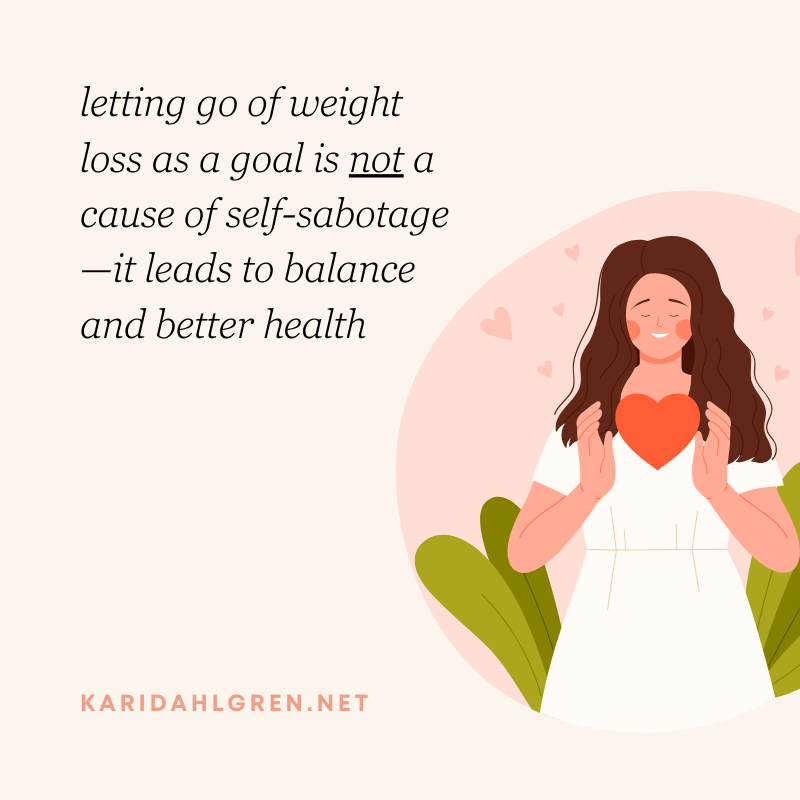
Ironically, another way to stop self-sabotaging weight loss is to move your focus away from weight loss entirely. Instead, shift your attention to the daily habits that make you feel good and support your overall health.
When you focus on the process—like listening to your body, moving your body in ways that feel good, and practicing mindfulness—you create a sustainable path to well-being without the pressure of achieving a specific number on the scale.
When weight loss is the focus, it often triggers self-sabotage by perpetuating weight cycling—the repeated loss and regain of weight. This happens because the body naturally defends its set point weight, slowing metabolism and increasing hunger when faced with restrictive dieting, making weight loss harder to maintain.[10]
Read this next: How to Fix a Damaged Metabolism After Dieting
Research shows that behaviors like intuitive eating, which shifts away from weight loss goals towards a balanced relationship with food, lead to better long-term health. A study in Eating Disorders found intuitive eating was linked to greater weight stability, while restrictive control was associated with weight cycling and instability.[11]
4. Master Emotional Self-Regulation to Stop Sabotaging Weight Loss
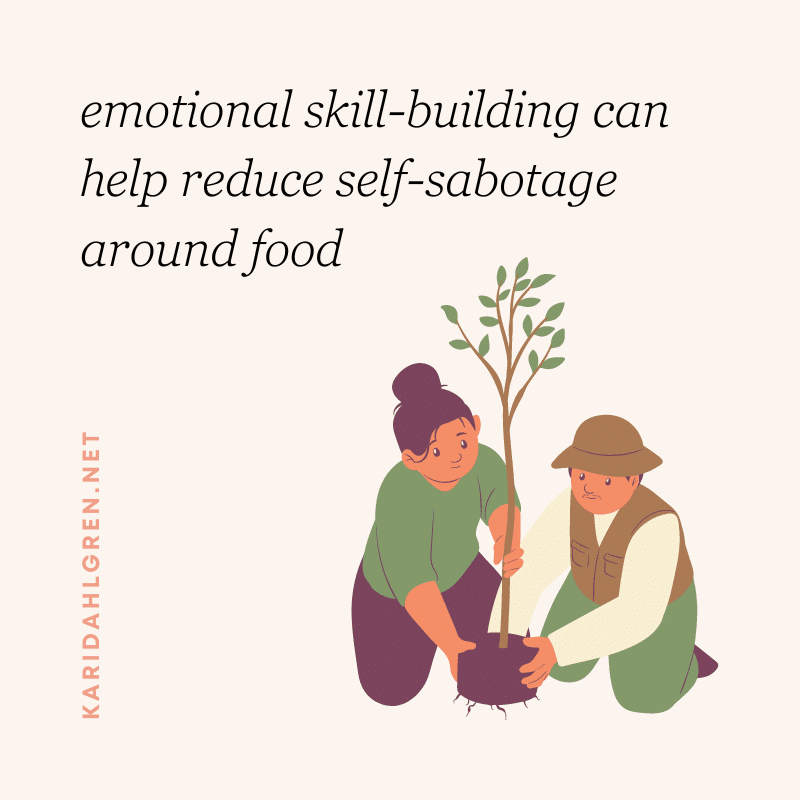
Food and diet aside, there’s another powerful way to learn how to stop self-sabotaging weight loss: fostering emotional self-regulation, or the ability to manage emotional responses. When emotions like stress, fear, or frustration go unchecked, they often lead to impulsive eating or negative coping mechanisms, such as binge eating.
According to a study published in Frontiers in Psychology, emotional self-regulation is key to maintaining mental health and well-being in daily life, showing how vital it is to develop these skills for long-term success.[12]
One way to enhance emotional self-regulation skills and heal your relationship with food is by incorporating my Stop, Drop, & Feel® technique into your daily habits. This mindfulness-based practice helps diminish the urge to eat beyond fullness by strengthening emotional self-regulation skills.
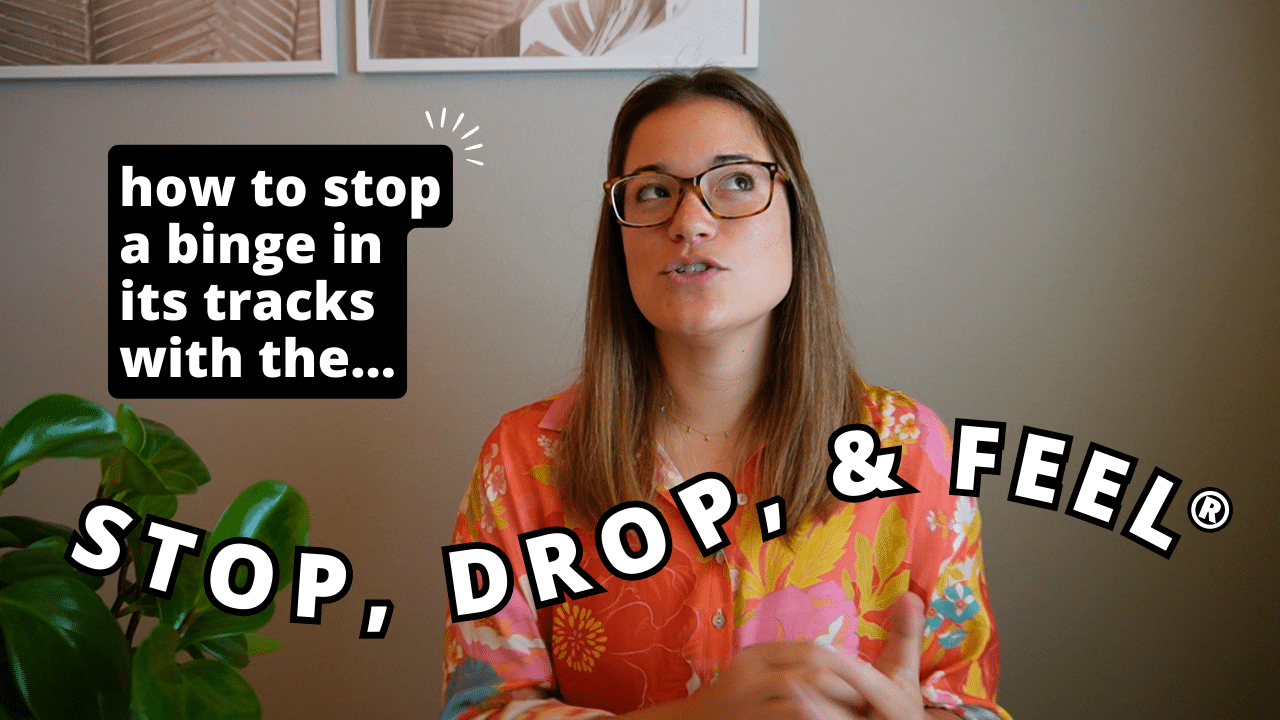
Instead of turning to food for comfort, the SDF encourages you to stop what you’re doing, drop into your body, and fully feel whatever emotions arise. Chances are, something uncomfortable will bubble to the surface because emotional eating is often driven by emotions like stress, sadness, and anxiety.[13]
By holding space for these emotions, you build emotional tolerance—an essential aspect of emotional self-regulation. This skill allows you to sit with discomfort without being swept away by compulsive behaviors.
Emotional tolerance is an essential skill for learning how to stop self-sabotaging weight loss because it helps you manage any conflicting feelings (cognitive dissonance) that arise, allowing you to process them in a healthier, more effective way.
Untangling the Knots of Self-Sabotage Around Food
Learning how to stop self-sabotaging weight loss is about managing the highly personal intersection between biology and psychology. We need to make sure that we’re not falsely accusing ourselves of “failing” at a diet if that diet triggers the body’s biological response to restriction and deprivation, which is to ramp up hunger and cravings.
While biology plays a crucial role in our responses to diet and food, it’s also our psychological terrain—our deeply entrenched beliefs—that can trip us up in big ways. Limiting beliefs, even when hidden in our subconscious, can manifest as barriers to our success.
Through journaling and self-inquiry workbooks like my bestselling Why We Do the Things We Do, we can uncover and challenge these deep-seated beliefs. Furthermore, by redefining our perspective on diet culture and focusing on intuition rather than restriction, we create a sustainable path towards holistic health—mind, body, and spirit.

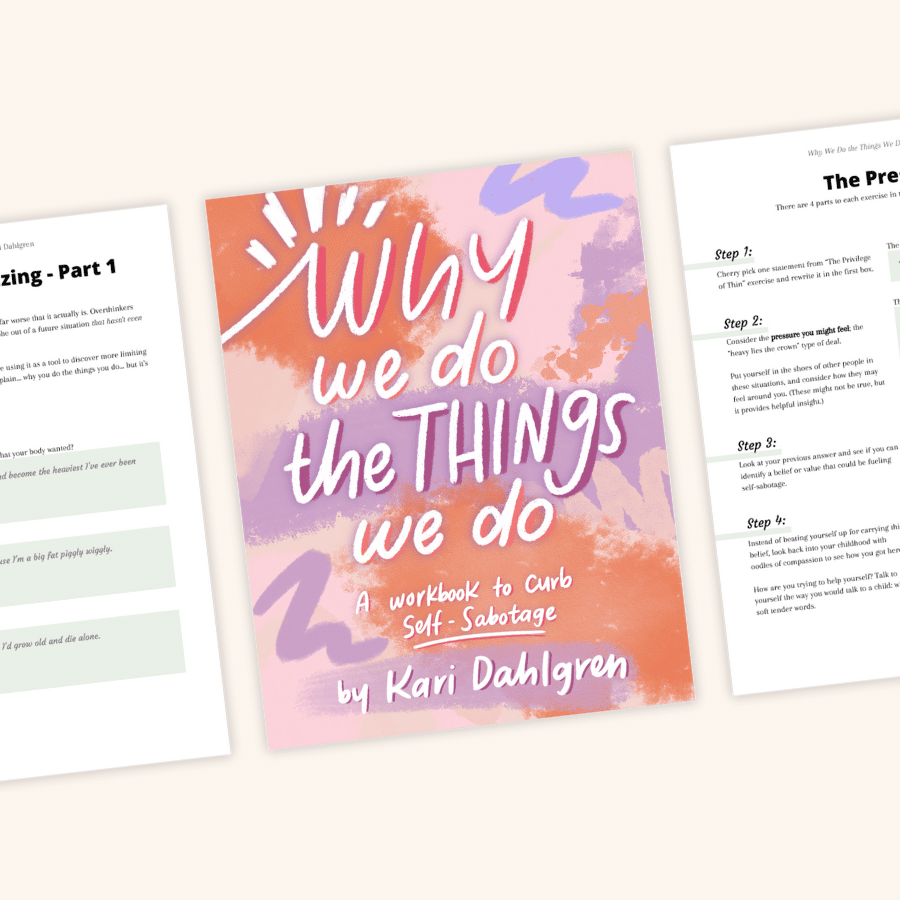
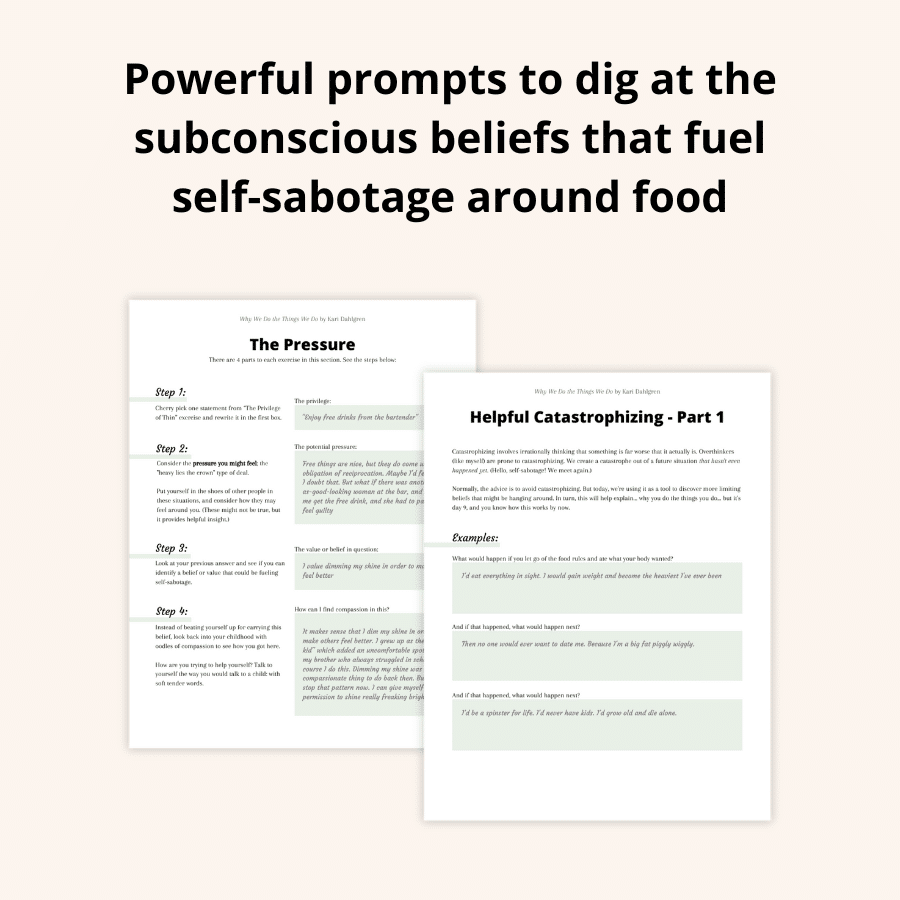



If i am normal with food then why am I overweight? I try to eat healthy and I exercise intently 2-3 times a week; i try hard to stay away from sweets as I fear becoming diabetic as I age and i definitely do not want that to happen; recently read blue zone diet and i am just beginning it and i like it
Hi Linda, I’d love to know more about what it means to you to be normal with food. It sounds like you have ideas for healthy living, so let me know where you’re stuck and I’m happy to help 🙂
I’m sitting at 187 I can’t stand it it’s been going on like a yo yofor probably more than 5 years, i lost my best friendhe was my husband at 1 pointbut i took care of him till he died. I don’t know if that’s it or if that’s just an excuse. But every time I start, I get to a point and I don’t do do it, and then I’m back at 187 and it’s not healthy and I want to be at 1:30. I get in my own way, I’m so upset. I’ve tried everything for weight watchers to any other thing you can think of except for the needles that you stick in your stomach which I don’t think are healthy so any ideas any suggestions? I really wanted to sit down with someone 1 on 1 and just talk, you know. I need to lose this weight. I’m upset with myself I don’t like myself I can’t fit in my clothes. I’m only 5 foot 1, so it says I’m obese. I’ve never been as heavy in my life. I can’t stand it and yet here I am so that’s my story. Thanks for listening
Hi Dellen! I have so much compassion for what you are going through, and I’m sure everyone else reading this can agree that yo-yo dieting is miserable. I’m sorry you’re going through the thick of it right now. I’ll try to point your in the right direction. I wonder if this blog post would be a great resource for you: How to stop compulsive eating with the Stop, Drop, & Feel. And here’s the link to learn more about coaching. I hope you can hold lots and lots of compassion for yourself as you move through these heavy emotions. I celebrate you for searching for answers beyond the layer of dieting!
I’ve had a problem with my weight gain since freshman college. I’ve yo yo’d all my life. However, I keep trying to do better. I have acknowledged that I sometimes sabotage myself. I thought I’d look further onto this dilemma and googled a search. Your information came up. I’m interested in your workbook. Insight is helpful and can lead to changing our habits. I know self sabotage reasons have changed over the years: early 20’s unwanted male attention; 40/50 I said I wasn’t defined by my physical body but my intellect and other qualities…rationalizations, now in my 70’s I don’t get why except habits I need to break. I’ve broken the habit of bedtime association to eat snacks to tune of up to 500 added calories! Still trying after all these years! Regards, PJM
Hi Patsy! Thank you so much for sharing this with me and anyone else reading this post on self-sabotage. I think we can all relate, to at least some degree! I admire your willingness to work on yourself and turn inward. Just your Google search alone must signify a newfound readiness for change. I wish you the best on this courageous path making peace with food the psycho-spiritual way! I hope your name pops up here on the blog again soon 🙂
When I was a kid, I was skinny up until my mom and I started moving around a lot. I didn’t (and still don’t) understand why we did. All I ever remember was going to schools and then leaving and going to a new house. It wasn’t until I was about 9-11 that we finally stopped moving around and moved in with my step-dad. He’s a great dad. But my just kept going up and up. All through middle school up until now (junior in highschool) it went up. I’m sitting at 218-222 at 5’0″. I don’t like my body most of the time, and I’m always afraid if people are laughing at me or something else. I always feel like all the eyes are on me. If not all of them, then some secret ones that spread rumors. I’m tired of all this. I want to be able to look like Bernadette from The Big Bang Theory but how am I supposed to look like her if I continue on like this? I starve myself during the school days because I’m afraid of eating in front of people and then I go home and I’m good when I’m alone but when my mom comes home and she starts eating, it’s like my body just goes “well, she’s eating so it’s okay for us to eat” and then I just go all ham on the food. (Pardon the pun) I don’t quote understand what this is.
Hi Carleigh! Thank you so much for sharing your story with me. It sounds like you’ve been through a lot of changes and challenges, and it’s completely understandable to feel the way you do about your body and eating. I celebrate you for your self-awareness and eagerness for growth.
It’s also important to recognize that everyone’s body is unique, including how it looks and how it changes over time. Comparing ourselves to others, even people we admire on TV like Bernadette from The Big Bang Theory, can often lead to feelings of inadequacy, which isn’t fair to you or your journey.
It sounds like you’re experiencing a lot of stress around eating, especially in public and at home. It’s also concerning to hear that you’re skipping meals during the day and feeling out of control around food later. This can create a cycle that is hard to break and can affect both your physical and emotional health.
Since you are still in high school, I highly recommend talking to someone who can provide support tailored to your age and experiences, like a school counselor or a trusted teacher. They can offer you support and possibly connect you with other resources that might help.
Remember, your value isn’t defined by your appearance or by what anyone thinks of you. You deserve to feel good about who you are, and to eat in ways that nourish your body without guilt or fear. <3